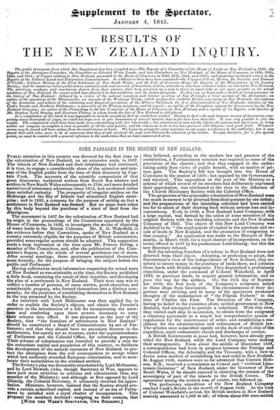RESULTS OF
THE NEW ZEALAND INQUIRY.
The public documents from which this Supplement has been compiled are—The Reports of a Committee of the House of Lords on New Zealand in 1838; the Reports of the Aborigines Committee, the Committee on Colonial Waste Lands, and two Committees on New Zealand, of the House of Commons, in 1836, 1838, 1840, and 1844; of Papers relating to New Zealand, presented to the House of Commons in 1840, 1841, 1842, and 1843; and numerous incidental notices in the Reports of the Colonial Land and Emigration Commissioners. In addition to these have been consulted—the Voyages of Cook, Meriora, De Survitle, and Dumont ; Collins's History of the First Settlement of New South Wales, and the Life of Governor King; the Reports of the Missionaries of the London Society; and the numerous recent publications, narrative and controversial, of travellers, settlers, and others, who have visited or taken an interest in New ZealandThe selections, analyses, and conclusions drawn from these sources, have been governed by a wish to throw as much kola as our space permits on the sand condition of New Zealand, the causes which have placed it in that condition, and its future prospects. To this end, we begin with a sketch of recent passages int the history of New Zealand : followed by a review of the natural resources and relative position of New Zealand; a brief account of the Aborigines ; am outline of the operations of the Missionaries; an account of the Waitangi Treaty, which professed to establish British sovereignty in New Zealand; descriptions of the personnel, and notices of the colonizing and financial operations, of the HobsonShortland, the first Administration of New Zealand; statistics of the Cook's Straits and Northern Settlements; a narrative of the Wairau massacre, and its sequels; an outline of the Complaint against the Government by the New Zealand Company; an outline of the Proceedings in the late Committee of the House of Commons on New Zealand, and a reprint of its Report; with sketches of Mr. Stephen, Lord Stanley, and Governor Fitzroy, in whose hands the fate of New Zealand is still played. In a compilation of this kind, it was impossible to include everything that we could have wished. Having to deal with such immense masses of documents, comprising many thousands of pages, we could not hope even to give summaries of several matters that might have been desirable. It was only possible to give the results. The compilation could have been made more entertaining with far less trouble ; but entertainment was not the object—the paramount object was, to bring within our compass as complete a view as possible of all the vital points; and the endeavour to do so has been pursued with diligence and good faith. Whatever errors may be found will have arisen from the inadvertence of haste. We began by giving for every assertion in our pages a reference to the authority; but it was found that such notes grew to be so numerous that they would overload the page and distract the attention of the reader. Except, therefore, for a few special points, we must be content with a general reference to the authorities that we have enumerated above.






















































 Previous page
Previous page